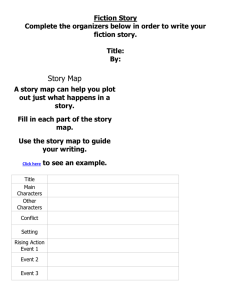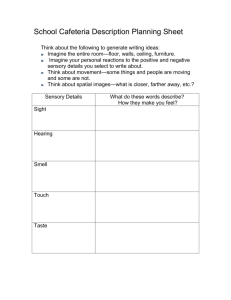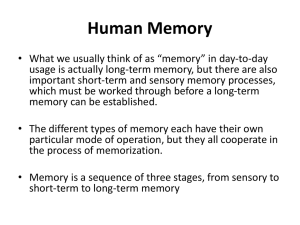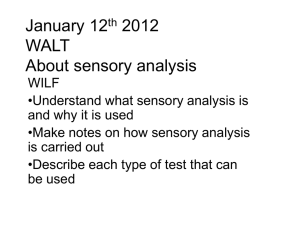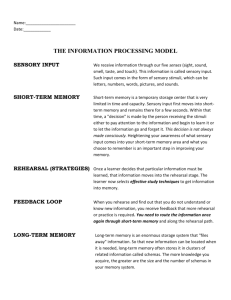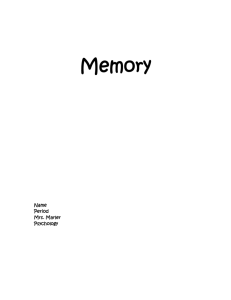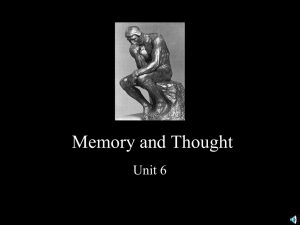Educational Psychology: Theory and Practice Chapter 6
advertisement
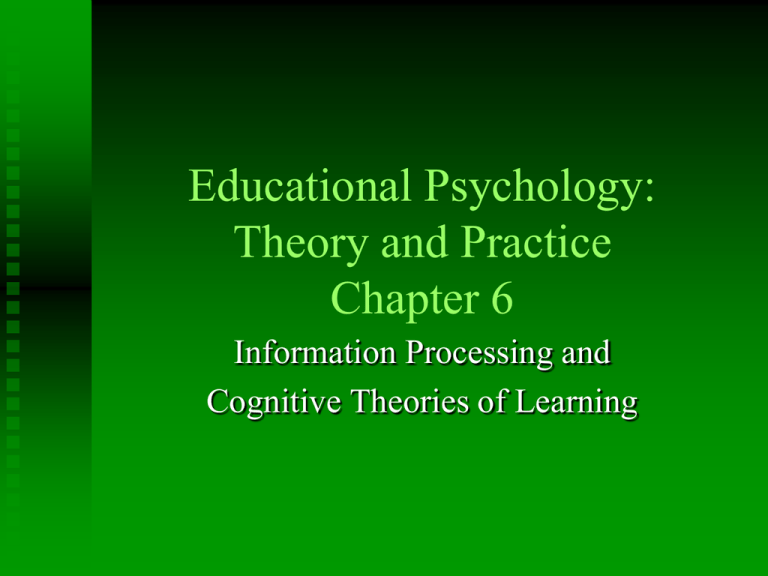
Educational Psychology: Theory and Practice Chapter 6 Information Processing and Cognitive Theories of Learning The Memory System Sensory Register Short Term (Working) Long Term ? Information Processing: Sensory Register Perception Very Brief Large Capacity Remembering: Attention Forgetting: Decay Sperling Chart Pause Here for Sensory Register Demonstration Information Processing: Sensory Register Demonstration Review Large Capacity Very Brief Decays Quickly Sensory Input Sensory Memory Attention Information Processing: Short-Term or Working Memory Smaller Capacity (5-9 Items) Contains What You Are Thinking Now Remembering: Rehearsal Forgetting: Displacement (Demonstrate) Remembering II: Making Better Use of Short-Term Memory Pause Here for Short-Term Memory Demonstration Information Processing: Short-Term or Working Memory Demonstration Review Capacity (5-9 Items) Information That Has Meaning is Easier to Remember Unfamiliar Information is Easily Displaced We Can Make Better Use of Short-Term Memory by Utilizing Pre-Existing Schemes Rehearsal Sensory Input Sensory Memory Attention ShortTerm Memory Information Processing: Long-Term Memory Capacity May Be Unlimited Remembering: Schemes (Connections) Forgetting: Retrieval Failure Rehearsal Sensory Input Sensory Memory Attention ShortTerm Memory Retrieval Storage LongTerm Memory Information Processing: Long-Term Memory Episodic Memory Semantic Memory Procedural Memory Information Processing: Factors That Impair Long-Term Retroactive Inhibition (Interference) Proactive Inhibition (Interference) Information Processing: Factors That Impact Long-Term Memory Dual Coding Retroactive Facilitation Proactive Facilitation Serial Position Effects Primacy Effect Recency Effect Connections: Chunking or Categories Levels of Processing Theory Verbal Learning Paired Associate Free Recall Serial Learning Strategies for Remembering: Mnemonic Devices Paired Associate Learning Imagery (See Next Slide) Strategies for Remembering: Mnemonic Devices Paired Associate Learning Imagery Free Recall Learning Organization Serial Learning Loci Pegword Pegwords One = Bun Two = Shoe Three = Tree Four = Door Five = Hive Six = Sticks Seven = Heaven Eight = Gate Nine = Vine (Line) Ten = Hen Other Memory Strategies: Rhyming Initial Letter What is Meaningful Learning? Rote Learning (Memorization of Facts) is Sometimes Necessary. However, Teachers and Students Can Work to Make Learning More Meaningful. 4x7=28 4x8=32 4x9=? Meaningful Information Inert Vs. Meaningful Knowledge Schema Theory

